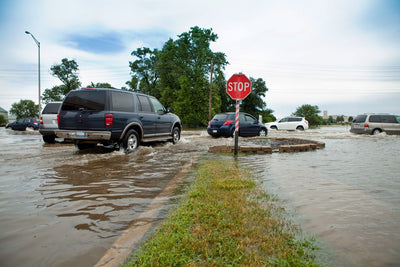How Do Hurricanes Affect Your Drinking Water?
RSS
Emily Driehaus | Science Communication Intern
The start of hurricane season not only brings the threat of deadly storms, but also the potential for problems with drinking water infrastructure and systems. Heavy rain and flooding from hurricanes can interfere with both public and private water systems and contaminate water sources, leaving individuals without safe drinking water for days after a hurricane.
Drinking Water Contamination From Stormwater Runoff
Stormwater runoff can contaminate both groundwater and surface water during a hurricane. As stormwater runs into a storm drain or the nearest body of water, it picks up both biological and chemical contaminants from the ground that make their way into the water supply. Impervious surfaces exacerbate this problem, as stormwater cannot penetrate the ground and instead sits on top of these surfaces, contributing to flooding during a hurricane. Some local governments, such as Washington, D.C. and other municipalities surrounding the Chesapeake Bay, are working to combat this issue by replacing impervious surfaces with materials that soak up stormwater and allow it to permeate the ground instead of sitting on top of surfaces gathering contaminants that harm drinking water supply.
Hurricane Flooding and Water Systems
The large influx of water from hurricane rain and flooding can overwhelm both public and private water systems, leading to the overflow of sewers, wells and other parts of water infrastructure. Combined sewer overflows are systems designed to collect stormwater runoff, sewage and other wastewater to be transported to a wastewater treatment plant to be treated before moving to a larger body of water. Hurricane rain and flooding can cause these systems to overflow and untreated water can spill into nearby water sources, potentially contaminating drinking water supply. Wells can also be contaminated with sewage, bacteria and other microorganisms due to hurricane flooding.
Hurricanes and Water Treatment Facilities
Water treatment plants are not immune to the power outages and structural damage caused by hurricane winds. Treatment plants can lose power and infrastructure can be damaged during a hurricane, leaving facilities without the ability to treat water. Equipment and infrastructure in water treatment plants can also be contaminated by runoff and floodwater. The inability of treatment plants to treat water due to power outages leads to boil water notices to ensure people in the affected area are not ingesting biological contaminants through their drinking water.
Case Study: Hurricane Harvey
Hurricane Harvey made landfall in southeast Texas on August 25, 2017, and bombarded the Gulf Coast with heavy rain and wind for days. The Category 4 storm caused $125 million in damage in Texas and Louisiana, including damage to water systems. According to the Texas Commission on Environmental Quality, 61 public drinking water systems and 40 wastewater facilities were declared inoperable and 203 boil water notices were issued during the storm. Flooding also damaged chemical and energy plants in the area, leading to the contamination of surface water and drinking water reservoirs with sewage, wastewater and toxic chemicals. All inoperable facilities, except one wastewater facility, were restored in the cleanup process following the storm. However, tap water was not safe to drink in some communities for months, with boil water notices lasting into December for some areas affected by the storm.
How To Prepare for Water Service Interruptions in a Hurricane
The best way to avoid losing access to clean drinking water is to prepare before the storm arrives. The National Hurricane Survival Initiative recommends beginning preparations as far in advance as possible to avoid the chaos at stores right before a hurricane hits. Buying bottled water is an option for individuals preparing for a hurricane, but prices can increase dramatically right before a storm due to increased demand. Alternatively, individuals can store their own water in the days before a hurricane hits. The NHSI recommends storing water in containers made out of durable materials, such as plastic bottles. Because hurricanes can leave water treatment plants without power and contaminate water sources, individuals should prepare enough water, about a gallon, per person for at least three days.
Other Articles We Think You Might Enjoy:How Do Wildfires Impact Water Quality?
What You Need To Know About Surface Water Pollution
How Are Public and Private Water Systems Susceptible to Temporary Outages?




